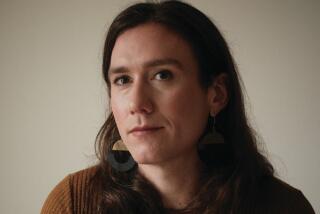A Marriage (Re)modeled on Genesis : ONION <i> by Kate Braestrup (Viking: $17.95; 194 pp.) </i>
- Share via
This is a great book packaged badly. “Onion” is a story about the most difficult imaginable relationship: genuine heterosexual intimacy.
From its obscure title and soft-mauve cover sporting a small etching of a cut onion, you might guess that it was a culinary love story. You would never guess that this is a brilliant, original, transforming, nourishing, profoundly religious, Biblically based story about spirituality, marriage, motherhood, husbands and lovers.
Ellen Elliot, its heroine, is a young woman married to a strong, caring, nice man--a policeman. She thinks about, cares for and loves her young son, called “Onion.” Her narrative concerns her abortion, her best girlfriend, her need for meaning, connection, security, her spiritual rebirth. She is Eve re-visioned.
Ellen overcomes temptation and recognizes her spiritual origin. She revises her human history in the light of the most inspired interpretation of Biblical creation. She finds peace, love and happiness in her marriage.
Viking has wrapped the book in a dust jacket that pitches “Onion” as a novel about Ellen Elliot, a feminist theologian, housewife and mother with esoteric sexual fantasies about a professor of electromagnetic physics. I quote from the inside flap: “As Ellen’s and Potocka’s imagined affair--as much dialectic as erotic--proceeds through discussions of Ohm’s Law and Gnostic theology, it provides a counterpoint for Ellen’s exploration of her past. . . .”
Say what?
Apparently Viking was not going for the numbers. There are hardly more women who would rather curl up with a book about esoteric university types engaged in mental foreplay than there are regular, average women, mothers hungering for spiritual nourishment drawn from the Bible. What there is, I think, is an imaginary line drawn in the publishing business.
That imaginary line separates “Christian” or “Religious” publishing from publishing , as if people who read the Bible are not people who read books that might find their way to the New York Times best-seller list. I don’t want to accuse, only suggest that Viking is hiding the light of “Onion” under a bushel.
Never mind. If you are one of the 70 million-plus women in the United States who attend church and read the Bible regularly, or if you are at all curious about what the Bible really says about the initial relationship between men and women, “Onion” is a must read. It dishes out Genesis smartly and succinctly. I quote from Page 56: “There are two distinct accounts of this inception in Genesis 1 and 2, and which you decide to quote most has tended, over the centuries, to depend on your sexual politics.”
Think of “Zen and the Art of Motorcycle Maintenance.” Then think of Phaedrus, universities and motorcycles replaced by God, theology and motherhood.
The publicity that accompanied the reviewer’s copy trivialized the book beyond all belief by likening it to “Diary of a Mad Housewife.” Perhaps they did not look deeply enough inside its cover to the meat of this contemporary moral and spiritual tale of a young woman’s daily life. Too bad.
“Onion” is a sensitive and insightful sermon. From Page 186: “God made creating Her image in the conduct of an ordinary everyday human life a matter of effort. Why on earth would receiving God’s blessings be as easy as only saying the right words once a week, when our well lived lives would be the finer prayer? And why, while we’re on the subject, should God be something that blesses us outright, when it makes so much more sense that She would have encoded our blessings in the richness of our human intercourses, that we are meant to be each other’s blessings?”
And yet a tale that culminates in the epiphany of the female protagonist--”That this at last is flesh of my flesh and bone of my bone”--is characterized by its publicists as “a tender and amusing look at the modern woman’s predicament.” No woman I know ever has characterized her married life or her struggle for spiritual identity and sexual union under the God of the Bible as a “tender and amusing predicament.”
Braestrup’s book is a novel about a religious experience. It echoes Luke’s report of Jesus’ words: “To what can I compare the Kingdom of God? It is like yeast that a woman took and hid in a bushel of flour till it all rose” (Luke 13:21).
More to Read
Sign up for our Book Club newsletter
Get the latest news, events and more from the Los Angeles Times Book Club, and help us get L.A. reading and talking.
You may occasionally receive promotional content from the Los Angeles Times.








